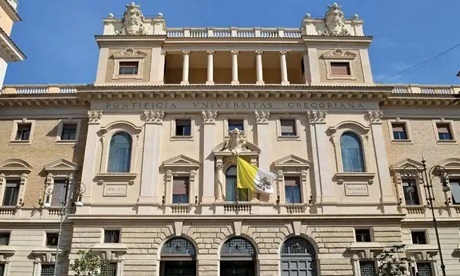The nature of power and how the abuse of power has been dealt with in the past and present were the focus of an international conference in Rome attended by about a dozen scholars earlier this month.
Experts in history, philosophy, sociology, political science, psychology and education came together at Rome’s Pontifical Gregorian University April 17-19.
They presented talks including: the effects of mass violence waged by colonial powers; the misuse of the memory of the Holocaust; sexual predation in the Catholic Church in the Middle Ages; and slave holding by Jesuits in the United States.
Jesuit slavers
Jesuit Father David Collins, a professor of history at Georgetown University, presented a case study of his order’s work in the United States.
This described “large communities of descendants of those who were held in slavery by Jesuits to develop programs of redress, repair and racial healing.”
Their work started because a building on the Georgetown campus was being remodeled and people thought it would be opportune to change the building’s name, he told Catholic News Service April 18.
The building had been named after an early 19th-century Jesuit who had played a role in the sale of hundreds of slaves in 1838.
The university’s president could have, “with a swipe of the pen,” changed the name right then and there to “something wholesome and edifying,” Father Collins said.
He said the president saw “that would be sort of erasing history, making it disappear,”.
He instead decided to make the name change “an opportunity to bring this history to the university’s attention” and get the wider community involved in the process.
This resulted in the 2015 creation of the working group on slavery, memory and reconciliation that Father Collins chaired.
The benefit of time
“How do good people become involved in bad things?
“How do good people have blindnesses that make them incapable of seeing something that we’re seeing with a certain amount of clarity a hundred years later?
“Those are important things to preserve,” Father Collins said.
Memorials, for example, are just “partial stories” that select and tell one side of an historical event, he said.
A city like Rome, he said, is “full of memorials that are about the exercise of power and for the good,”.
However, “these very exercises of power have had their victims and have done their violence.
“We need to understand that better than we have” and “to add to the part of the story that is neglected, which is that it’s come at a cost.”
The abuse crisis
Kathleen Sprows Cummings, a professor of history at the University of Notre Dame and former director of its Cushwa Center for the Study of American Catholicism, spoke to CNS.
She said part of her work is “to think about saints as a way to … think about who we remember and why.
“This is also occurring in the backdrop of a conversation we’re having in the United States” and elsewhere about “who do we honor and why through our memorials and monuments,” she said.
Her talk to the conference, she said, wove together clerical sex abuse in the United States, “how this is impacting the saints we remember and the saints we’re making and the saints we’re not making, and how that is connected to public enshrinement.”
One example of reinterpreting existing saints, she said, is looking at the life of St. Maria Goretti.
She died in 1902 at the age of 11 after she was stabbed by a 20-year-old for refusing his sexual advances and attempted rape.
“When I was growing up in a Catholic high school, the suggestion was that she was resisting temptation. She was being chaste,” Sprows Cummings said. More to the point, “she was a child.”
Today, the patron saint of chastity and purity is more often upheld as a patron saint of abused children and rape victims.
Furthermore, she said, “some dioceses call her the patron saint of safe environments for their training.”
The abuse crisis has affected not only how people see saints from the past, but also future candidates, “perhaps saints who were whistleblowers or saints who did what they could,” she said.
For example, she said, there is a change.org petition for the cause for canonistion of Sister Catherine Anne Cesnik, a member of the School Sisters of Notre Dame.
She was found dead near a garbage dump in Baltimore in 1970. Her unsolved murder was featured in the Netflix documentary series, The Keepers.
“I don’t think she’s going to be canonised but the very fact that they’re calling for it is indicative of a search for heroes,” she said. Read more
Carol Glatz is a Senior Correspondent at Catholic News Service, Washington DC-Baltimore Area
Additional readingNews category: Analysis and Comment.




